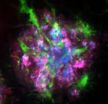(Press-News.org) For patients with cervical cancer that has recurred after treatment or has spread elsewhere in the body, adding the experimental drug cediranib to standard chemotherapy improves tumour shrinkage and adds a modest improvement in progression-free survival, researchers report at the ESMO 2014 Congress in Madrid.
In Europe, about 70% of patients with cervical cancer are cured by either surgery or chemo-radiotherapy. Those patients with recurrent or secondary cancer have a very poor outlook. Only about 20-30% have tumour shrinkage after conventional chemotherapy and survival is usually less than one year.
In the phase II CIRCCa trial, researchers compared two groups of patients with relapsed or metastatic cervical cancer given conventional chemotherapy with carboplatin and paclitaxel plus either cediranib (34 patients) or an identical looking placebo tablet (35 patients).
"Cervical cancers with a well-developed blood supply can have a particularly bad outcome. The experimental drug cediranib blocks the cell surface receptor VEGF, which stimulates the growth of new blood vessels to feed the growth of tumours," explains study researcher Dr Paul Symonds, of the Department Cancer Studies & Molecular Medicine at the University of Leicester, UK.
In the study, patients who received cediranib in addition to chemotherapy had greater tumour shrinkage than those treated by chemotherapy plus placebo (66% versus 42%). There was also a modest but statistically significant increase in median progression-free survival (35 versus 30 weeks). There was no statistically significant difference in median overall survival.
One month into treatment, VEGF receptor 2 levels in blood were more likely to be reduced in cediranib group (median change in log10 VEGFR-2 from baseline 0.036 versus 0.067).
Side-effects, particularly raised blood pressure and diarrhoea were increased in patients taking cediranib and were treated with standard medication.
Targeting the tumour blood supply seems to be a promising way to increase the effectiveness of chemotherapy in cervical cancer, Symonds says. "Recurrent or metastatic cervix cancer is really difficult to treat with a low response rate and poor survival. This study has opened up a new avenue of investigation for a difficult-to-treat cancer."
The researchers are now conducting an individual patient analysis to correlate response to chemotherapy with the fall in VEGFR receptor levels in the blood. They are also looking at other tumour biomarkers that may have been reduced by cediranib.
Commenting on the study, Dr Andres Poveda, Head of the Gynecological Oncology Clinic at Fundación Instituto Valenciano de Oncología, Valencia, Spain, who was not involved in the research, said the CIRCCa study is the second recent trial to show the benefit of adding an antiangiogenic drug to chemotherapy in cervical cancer.
"The impact on progression-free survival is important, and other trial objectives were reached, such as response rate," Poveda said.
Poveda also noted that recent years have been positive for the treatment of cervical cancer. "For two decades, advances in treatment for patients with advanced cervical cancer had been slow and scarce," he said. "Between 1989 and 2009, modifications of chemotherapy regimens resulted in an increased survival rate of just four months. Then the first study to include an antiangiogenic drug, bevacizumab, obtained spectacular results, offering a survival benefit of four months in one study--which is the equivalent to that obtained over the previous 20 years."
"The FDA recently approved the use of bevacizumab as it completely changed clinical practice," Poveda added. "We are now waiting for phase III results to confirm the favorable predictions of this treatment with cediranib."
INFORMATION:
Adding cediranib to chemo improves progression-free survival for meta or recurrent cervical cancer
2014-09-29
ELSE PRESS RELEASES FROM THIS DATE:
Many patients lack information about the use of targeted therapies, oncologists say
2014-09-29
More than three quarters of oncology specialists in Europe, South America and Asia believe their patients are not always well enough informed about the treatment options available to them, survey results have revealed at the ESMO 2014 Congress in Madrid, Spain.
The results come from an online survey of 895 doctors from 12 countries in Europe, South America and Asia. All were practicing oncology specialists, with more than three years' experience, treating more than fifteen patients a month.
While 82% of those surveyed believed that deciding on a course of treatment ...
Under-representation of women in oncology leadership positions
2014-09-29
A growing number of oncologists in Greece are female, but women continue to be under-represented in leadership positions, according to a survey reported at the ESMO 2014 Congress.
"In Greece, and across Europe, women oncologists still find it hard to access leadership or academic positions," said Dr Helena Linardou, Associate Director of the 1st Department of Oncology at the Metropolitan Hospital, Athens, Greece, who presented the survey results at the congress.
"Women are indeed increasingly choosing oncology specialties in Greece, however, most decision-making posts ...
Is expressive suppression effective in reducing negative emotion?
2014-09-29
A recent study based on a Chinese sample gives an answer to this question. The research shows that in Chinese culture, emotion- expressive suppression is not only able to dampen negative emotion effectively, but also dampen negative emotion faster than Cognitive reappraisal. This sheds much light on how to quickly regulate negative emotion in urgent situations, particularly when people from East-Asian cultures are concerned.
This study has been published in SCIENCE CHINA: Life Sciences (IN CHINESE) , which is titled "The efficiency of negative emotion regulation: ...
Using the brain to forecast decisions
2014-09-29
You're waiting at a bus stop, expecting the bus to arrive any time. You watch the road. Nothing yet. A little later you start to pace. More time passes. "Maybe there is some problem", you think. Finally, you give up and raise your arm and hail a taxi. Just as you pull away, you glimpse the bus gliding up. Did you have a choice to wait a bit longer? Or was giving up too soon the inevitable and predictable result of a chain of neural events?
In research published on 09/28/2014 in the journal Nature Neuroscience, scientists show that neural recordings can be used to forecast ...
Smart, eco-friendly new battery to solve problems
2014-09-29
Present-day lithium batteries are efficient but involve a range of resource and environmental problems. Using materials from alfalfa (lucerne seed) and pine resin and a clever recycling strategy, Uppsala researchers have now come up with a highly interesting alternative. Their study will be presented soon in the scientific journal ChemSusChem.
'We think our discovery can open several doors to more environment-friendly, energy-efficient solutions for the batteries of the future,' says Daniel Brandell, Associate Professor at the Department of Chemistry, Uppsala University, ...
Protein that causes frontotemporal dementia also implicated in Alzheimer's disease
2014-09-29
SAN FRANCISCO, CA—September 28, 2014—Researchers at the Gladstone Institutes have shown that low levels of the protein progranulin in the brain can increase the formation of amyloid-beta plaques (a hallmark of Alzheimer's disease), cause neuroinflammation, and worsen memory deficits in a mouse model of this condition. Conversely, by using a gene therapy approach to elevate progranulin levels, scientists were able to prevent these abnormalities and block cell death in this model.
Progranulin deficiency is known to cause another neurodegenerative disorder, frontotemporal ...
Predicting landslides with light
2014-09-29
WASHINGTON, Sept. 29, 2014—Optical fiber sensors are used around the world to monitor the condition of difficult-to-access segments of infrastructure—such as the underbellies of bridges, the exterior walls of tunnels, the feet of dams, long pipelines and railways in remote rural areas.
Now, a team of researchers in Italy are expanding the reach of optical fiber sensors "to the hills" by embedding them in shallow trenches within slopes to detect and monitor both large landslides and slow slope movements. The team will present their research at The Optical Society's (OSA) ...
Scientists identify the signature of aging in the brain
2014-09-29
How the brain ages is still largely an open question – in part because this organ is mostly insulated from direct contact with other systems in the body, including the blood and immune systems. In research that was recently published in Science, Weizmann Institute researchers Prof. Michal Schwartz of the Neurobiology Department and Dr. Ido Amit of Immunology Department found evidence of a unique "signature" that may be the "missing link" between cognitive decline and aging. The scientists believe that this discovery may lead, in the future, to treatments that can slow or ...
Nivolumab shows signs of superior response rate compared to standard chemo in advanced melanoma
2014-09-29
The monoclonal antibody nivolumab achieves superior response rates and a longer duration of response than standard chemotherapy[1] in patients whose melanoma has progressed after treatment with ipilimumab, according to phase III data presented at the ESMO 2014 Congress in Madrid, Spain.
"Previously-treated advanced melanoma patients have limited options," says the study's principal investigator, Professor Jeffrey Weber, Director of the Donald A. Adam Comprehensive Melanoma Research Center of Excellence at the Moffitt Cancer Centre, Tampa, Florida.
Nivolumab is an antibody ...
New data on combination treatments for melanoma
2014-09-29
Combination therapy with both BRAF inhibitor vemurafenib and MEK inhibitor cobimetinib achieves greater progression-free survival and response rates than vemurafenib plus placebo in BRAF-mutation positive melanoma, according to phase III data presented at the ESMO 2014 Congress in Madrid, Spain.
"Before the results of this study, we knew that cobimetinib plus vemurafenib could be safely delivered together with highly promising rates of tumour shrinkage; however until the performance of a scientifically rigorous randomised trial the potential magnitude of this benefit ...


